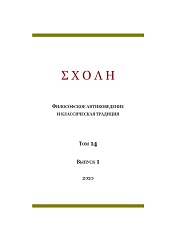Источники для образа Афродиты у Эмпедокла
Sources of the image of Aphrodite in Empedocles
Author(s): Anna AfonasinaSubject(s): Archaeology, Poetry, Ancient World, Greek Literature, Ancient Philosphy, Hermeneutics
Published by: Новосибирский государственный университет
Keywords: Empedocles; Aphrodite; Ancient Greek epic poetry; Homer; Hesiod; Herodotus; Near East goddesses; religious practice; archaeological data on Aphrodite;
Summary/Abstract: Empedocles uses two forces to describe the world process, the emergence and destruction of space - Love and Strife, which work in turn, and in due time, replace each other. It is obvious that love is responsible for unification and creation, and hostility for division and destruction. At first glance it seems quite natural that it is the power of unification that Empedocles calls Aphrodite. However, when you look closely at the fragments of the poem, the image of Aphrodite is not so unambiguous: she acts as a god-craftsman, that is, not just watches from afar as the roots of things are connected to each other, but mixes them with her own hands and is directly involved in the creation of living beings. We meet her involved in such activities as metal casting, pottery, and artwork. This naturally leads to the question from where did she get so many different functions? To answer this question, one should turn to literary sources about Aphrodite both before and after Empedocles’ life (in the context of Homer’s epos and Hesiod’s poem), consider the religious tradition of Cyprus and especially the East, neighboring Greece, from where, in the opinion of some scientists, the goddess could get into the Mediterranean cultural landscape (most important study here is the work by Nano Marinatos), to study archaeological data and findings related to Aphrodite. Taking into account Empedocles’ interest to bloodless sacrifices I will try to tie his views with the later orphic tradition. At the same time, in order to protect myself from losing the way in the forest of such huge massif it is necessary to restrict the area of this study. I will concentrate only on the activities of Aphrodite as she is presented in Empedocles.
Journal: ΣΧΟΛΗ. Философское антиковедение и классическая традиция
- Issue Year: XIV/2020
- Issue No: 1
- Page Range: 293-308
- Page Count: 16
- Language: Russian

